Festive family tradition
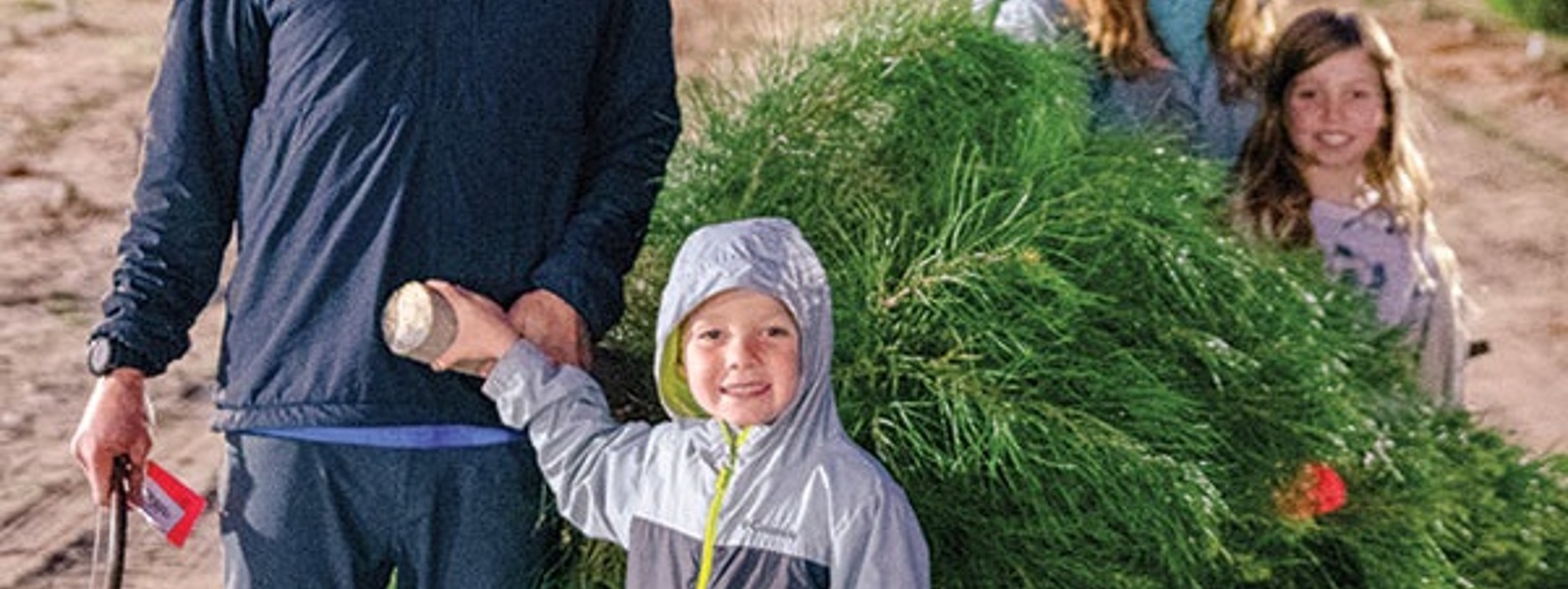
November/December 2023 California Bountiful magazine
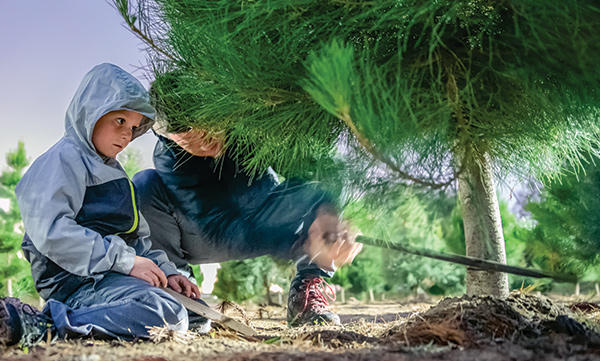
Visit to Christmas tree farm makes a fun outing for all ages
Story by Christine Souza
Photos by Silas Fallstich
It’s beginning to look a lot like Christmas at Holloway’s Christmas Tree Farm in Nipomo.
Each year since its opening in 1962, the San Luis Obispo County tourist destination hosts thousands of visitors who come to the farm to sip hot chocolate, drive pedal cars, pet farm animals and search for the perfect Christmas tree.
The 45-minute trek to Holloway’s Christmas Tree Farm, owned by Carl and Debbie Holloway, is a seasonal highlight for Carly and Danny Ender of Cayucos. The couple travels to the farm with daughter Raylan, 8, and son Greyson, 6, to locate the centerpiece to their holiday.
“It’s a special tradition to go and cut down your Christmas tree with the family,” Carly Ender says. The foursome selects a Monterey pine, which she describes as a “beautiful, vivid green.” Once the tree is home, “the house smells beautiful for the entire month.”
Of the farm, Ender describes the scene there as “festive and fun,” adding, “The kids love running around and choosing the tree. Plus, they love the rides and get hot chocolate with a candy-cane straw.”
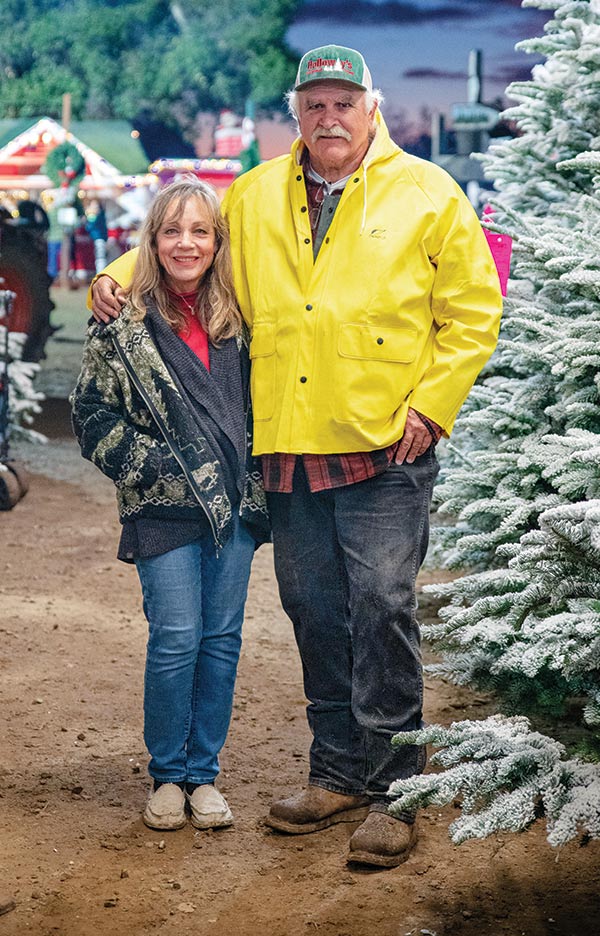
Tree farming
Holloway’s Christmas Tree Farm grows a few thousand choose-and-cut Monterey pines and sells an equal number of pre-cut Noble firs and Fraser firs from farmers in Oregon and Washington. After pre-cut trees arrive, Carl Holloway and his employees trim the trunks and place the trees in shaded ponds that contain a few inches of water to keep them fresh.
“Everything is kept watered all the time, which has made a ton of difference with the way we keep trees,” Holloway says. “We get people calling us in January and February saying, ‘We loved our tree. It was the freshest tree we’ve ever had.’”
At Holloway’s, choose-and-cut Monterey pines and pre-cut firs sell for between $69.95 for 4-to-6-foot trees and $300 for 12-to-13-foot trees. The farm also offers potted trees and wreaths and kicks off the season by distributing about 400 free seedlings to customers on opening weekend—this year starting Nov. 17.
The Monterey pine, Holloway says, has sturdy branches and a wonderful smell. The variety “grows extremely fast, about 3 or 4 feet per year, and must be trimmed as it grows to take the shape of a traditional Christmas tree.”
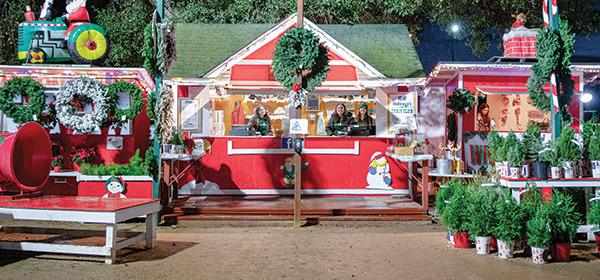
A fun day trip
San Luis Obispo resident Joe Benson says his family’s visits to Holloway’s Christmas Tree Farm provide a welcome change of pace after spending most of his workdays behind a desk.
“I like the excitement that comes from grabbing a handsaw and cutting down the tree on my own. It makes me feel like a lumberjack,” he says, and adds, “I love seeing my now-8-year-old daughter, Carmen, running through the farm to find the perfect tree. I look forward to ushering her towards a tree that will actually fit in our house.”
The Benson family makes it a priority to experience all the farm has to offer. Benson says his wife, Erin, may not admit it, but she is first in line to hop aboard Holloway’s quad train ride that loops around the farm and carries riders of all ages over small hills.
A pipefitter welder by trade, Carl Holloway says “everything we do is pretty much farm-grown or farm-built.” He built the quad train and the pedal cars, which “are so popular that people crowd in line to ride them every year.”
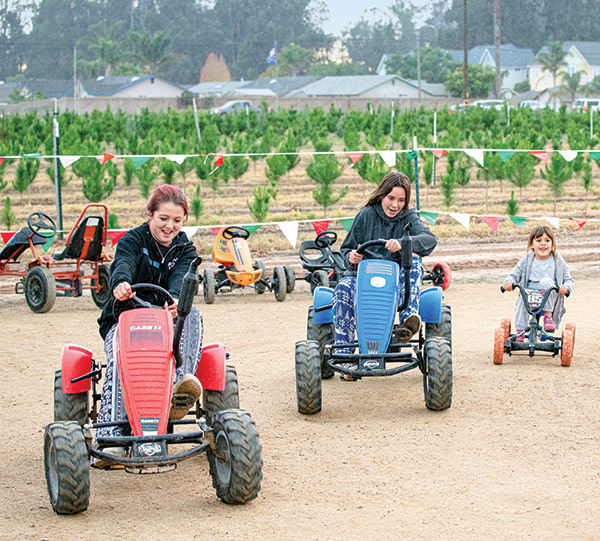
Rewarding business
Holloway says purchasing farm-raised Christmas trees is good for the environment because they are 100% natural and are recycled annually as more trees are planted.
“A Christmas tree is a carbon scrubber and an oxygenator,” he says. “It is just the only way to go because it’s a real tree.”
He also points out that locally grown trees support the local economy: “Nipomo is a pretty small town, and we employ about 70 young people, so they can have that first-job experience.”
The number of Christmas tree farms has been declining as the farms close and farmers retire. According to the U.S. Department of Agriculture, the Golden State experienced a 15.8% drop in Christmas tree farms from 2012 to 2017—from 385 to 324—while the number of farms nationally declined by 3.1% to 15,008. The National Christmas Tree Association estimates 22.34 million farm-grown Christmas trees were sold in the U.S. last year, at a median price of $80.
Holloway says he and his wife, who oversees the business side of Holloway’s Christmas Tree Farm, are proud that their Christmas tree farm has brought joy and provided an important tradition for so many people over the past 60 years.
“We will have several generations of families come through the gate,” he says. “We may have two or three brothers and sisters come with their kids, and here comes Grandma and Grandpa, and they’re bringing the other half of the family, so everybody comes. It’s just a family thing.”
Says visitor Joe Benson, “Going to Holloway’s is a wonderful part of my family’s holiday tradition and I hope it stays that way.”
Water is key to a long-lasting Christmas tree
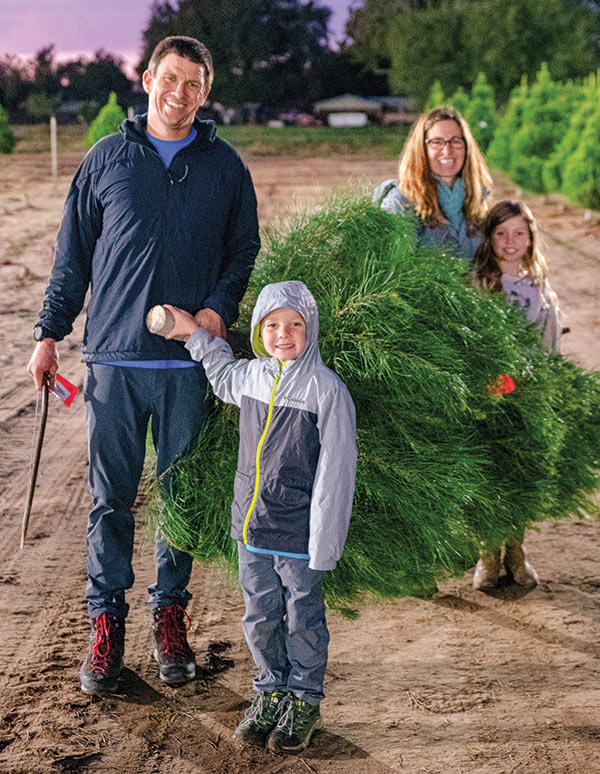
Few things put the kibosh on a holiday like a bone-dry Christmas tree. To keep the tree fresh and prevent needles from falling to the floor before Santa arrives, California Christmas tree farmers say hydration is key.
“Trees are expensive, so if people get their tree home and it dries out and looks terrible by Christmas, they’re not happy with the experience,” says Carl Holloway, owner of Holloway’s Christmas Tree Farm in Nipomo. “We suggest always keeping it watered so that it lasts throughout the season.”
To ensure farm-grown trees stay fresh, the National Christmas Tree Association recommends the following:
• For pre-cut trees, ask when the trees were delivered and ask for recommendations about which species perform best in your climate.
• Do a branch or needle test by running a branch through your enclosed hand. Needles of a fresh tree will remain intact, whereas those of a dry tree will release easily. Look for other indicators of dryness, such as needle pliability, discolored foliage, musty odor and wrinkled bark.
• Once home, place the tree in water as soon as possible. Most species can take up water for six to eight hours after being cut from the trunk.
• Display the tree in water in a traditional reservoir-type stand with adequate water-holding capacity. As a general rule, stands should provide 1 quart of water per inch of tree stem diameter.
• Keep trees away from major sources of heat (fireplaces, heaters, heat vents and direct sunlight). Lowering the room temperature should slow the drying process.
Learn more about farm-grown Christmas trees at realchristmastrees.org.

